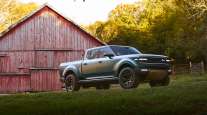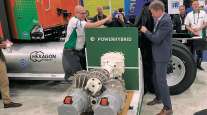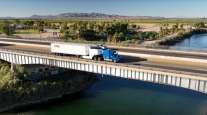Wal-Mart Unveils Concept Design for Rig With Hybrid Power, Lightweight Materials
This story appears in the Feb. 24 print edition of Transport Topics.
Wal-Mart Stores Inc. has unveiled a concept tractor-trailer that includes a hybrid-electric powertrain and the first-ever trailer made from a solid sheet of lightweight carbon fiber.
The company showed the vehicle Feb. 17 during a meeting to report on progress in accomplishing its sustainability goals.
The Wal-Mart Advanced Vehicle Experience, or WAVE, also features a radically designed truck cab, with the driver sitting in the center with electronic controls on either side and a door that slides open.
Vendors including Peterbilt Motors Co., Great Dane Trailer and Capstone Turbine Corp. helped assemble the vehicle, which is expected to be on display at next month’s Mid-America Trucking Show in Louisville, Ky.
Wal-Mart ranks No. 4 on the Transport Topics Top 100 list of the largest U.S. and Canadian private carriers, with more than 6,500 tractors and more than 61,000 trailers.
In 2005, the company set a goal of doubling the efficiency of its truck fleet by 2015. Chris Sultemeier, head of corporate transportation services for Wal-Mart, said the company has reached 80% of its goal by buying more fuel-efficient trucks and finding ways to ship more goods in less space, using fewer trucks.
In Canada, Wal-Mart is testing a super-high-capacity tractor-trailer that carries 40% more merchandise than a standard 53-foot rig.
The Bentonville, Ark.-based retail giant also is testing vehicles that run on waste grease and natural gas, plus it is investigating several models that use hydraulics and other power-assist technologies to reduce fuel consumption.
Capstone, a company based in Chatsworth, Calif., makes small turbines that are sold primarily to electric and gas utilities and to energy companies to supply power in remote locations.
Bill Kahn, manager of advance concepts at Peterbilt, said turbine technology has been evaluated for use in cars and trucks in the past.
“We’ve pushed the traditional diesel engine as far as we can from an efficiency standpoint,” Kahn said in an interview with Transport Topics. “To be more efficient, we have to be willing to look at alternative powertrains.”
Kahn said the turbine-powered powertrain alone is at least 30% more fuel-efficient than a current diesel engine but that further development of batteries and powertrain components will be the key to commercialization.
Elizabeth Fretheim, director of business strategy and sustainability for Wal-Mart’s logistics business unit, said the WAVE hybrid powertrain is “fuel neutral” and does not require any emissions controls.
Fretheim said the carbon fiber trailer is almost 4,000 pounds lighter than existing trailers and represents a technical breakthrough.
“Not only is this the first time a trailer has been made of carbon fiber, but it’s actually the first time one-piece 53-foot panels of carbon fiber have been manufactured,” she said.
The trailer has a rounded front panel that increases the aerodynamics of the tractor-trailer unit and adds additional cargo space inside the trailer, she said.
“It’s an entire package of firsts that we’re really excited to see come together,” Fretheim said in a video shown at the Wal-Mart meeting.
Asked by Sultemeier when the prototype vehicle will be seen on the road, Fretheim said the company has more to learn before the technologies are ready to use.
“These are one-of-a-kind and really first-of-their-kind technologies that we’ve already learned a lot from and will continue to learn from over the next couple of years through some testing,” Fretheim said.
She said Wal-Mart is buying more fuel-efficient tractors.
“We going to be transitioning in over 1,000 new 2014 tractors that have an expected efficiency increase of up to 12%, and that could mean $40 million to the bottom line,” Fretheim said.
Sultemeier said the company also has signed a contract to buy 2,000 forklift trucks powered by hydrogen fuel cells for use in its U.S. and Canadian distribution centers.




